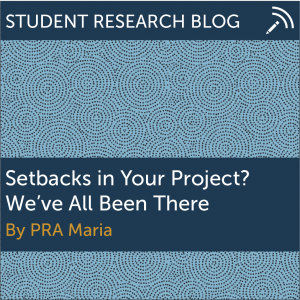 By Maria Latta, OUR Peer Research Ambassador
By Maria Latta, OUR Peer Research Ambassador
Whether you are working on lab work, human subjects research, an outreach project, or a creative endeavor, you have probably faced at least one setback along the way. I certainly have. Some of the challenges I have faced are: my experiments produced results that didn’t support my hypothesis, my IRB approval was delayed and required revisions, the organizations I partnered with underwent changes that impacted the timeline of my project, and I have just had mental blocks on how to move forward.
You are not alone! Everyone who has engaged in a research or creative project has faced challenges like these. It is very easy for us to focus on the outcomes of our project, but we need to shift our perspective. No project goes perfectly and we don’t need to have a flawless experience or ideal outcomes in our research. It is through challenges that we grow as students, researchers, and leaders.
Here are some things to keep in mind when facing challenges:
- Be flexible with your timeline.
Your original timeline was just a tentative plan. Timelines can be influenced by a variety of factors including IRB approvals, community partners, and equipment. When changes in these factors occur outside of our control, we need to be flexible to move things around. You could consider extending the time spent on literature review, inspiring additional hypotheses or approaches.
- Be willing to reach out.
Use delays in data collection or project initiation to reach out to graduate students, professors, or other community organizations to get feedback about your approaches to ensure your project is optimized before it begins. These contacts could also become future collaborators in your project or a future endeavor.
If your data collection has already begun but your outcomes aren’t what you expected or hypothesized, principle investigators and graduate students are a great source of ideas for new approaches if that is the best direction for your project.
Contact the IRB office if your proposal requires revisions. For many undergraduate students, this is our first time seeing or filling out the various (and lengthy) applications. The IRB staff are always happy to meet with undergraduate students in-person or over the phone. This is their expertise and can answer almost any question you have about your application.
Trust me – I know how hard it can be when you are excited about your first research experience and it doesn’t go the way you expected. Remember a couple of things.
You are not alone. You are learning and growing. You can handle this. Take a deep breath.
Maria is a senior majoring in Pharmacy Studies and minoring in Molecular and Cell Biology and Sociology. Click here to learn more about Maria.